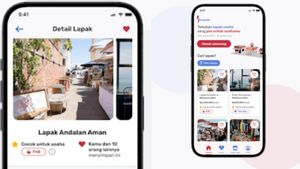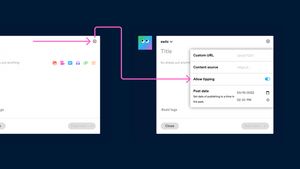JAKARTA - Recent research reveals that nearly half of Generation Z claims to live doubles in cyberspace. Experts who surveyed 2,000 Americans found that 46 percent of the age group 16 to 24 years felt there was a significant difference between themselves in cyberspace and in the real world.
One in five people from all generations also admit that they have a secret internet persona that others don't know about.
Experts behind the study urged people to have more discussions with friends and family to understand the world with each other, although they warned that the survey was only observational.
"About one in five teenagers in the world has mental health conditions, reflecting a global crisis. We hope this social experiment will encourage more conversation between friends and family about the need to understand each other's world for mental well-being," said Gerald Youngblod, head of marketing for North America at technology company Lenovo. conducts this research.
Of the 2,000 people surveyed, they were divided equally by generation. Experts found that 38 percent of Millennials (born between 1981 and 1996), 18 percent of Generation X (born between 1965 and 1980), and eight percent of Baby Boomers (born between 1955 and 1964) admit that their online personalities are very different from how they present themselves in real life.
Meanwhile, nearly a third of Gen Z (born between 1997 and 2012) said they were hiding their online world from their families. More than a quarter of Millennials say the same thing.
More than half Gen Z also claims it's easier to express themselves online than offline, compared to 40 percent of the overall respondents and less than a quarter of Baby Boomers.
Experts also found that Gen Z is not always happier by maintaining dual life in cyberspace. The survey shows that 68 percent of Gen Z respondents feel disconnected between who they are in cyberspace and the real world - where those who experience it say it causes feelings of anxiety (18 percent), loneliness (17 percent), and depression (15 percent).
SEE ALSO:
When asked which topics they feel more comfortable sharing online than offline, about a fifth said they were more likely to share their ambitions on the internet than face-to-face, where 22 percent said they liked or liked them, 19 percent of their beliefs - politics or others - 17 percent of their fear and insecurity and 15 percent of their opinions and values.
The study also revealed that 61 percent of Gen Z said they hoped to have challenging conversations with friends and family offline.
Of the 23 percent of young adults who feel more comfortable being themselves online, 27 percent say they believe they will not face an assessment on the internet, while 22 percent are not afraid to be authentic and 23 percent have formed stronger relationships online.
However, 54 percent of Gen Z says that speaking professionally trained will increase their confidence to communicate more openly with their loved ones in the real world.
The English, Chinese, Japanese, Arabic, and French versions are automatically generated by the AI. So there may still be inaccuracies in translating, please always see Indonesian as our main language. (system supported by DigitalSiber.id)















